You’re a refugee fleeing war and violence. Or maybe you’re fleeing extreme poverty or the threats of gangs.
You are one of the very few allowed in to America, one of the lucky chosen to start over here, a new life.
How do you begin?
When Yassin Terou and his family fled Syria in 2011, they were settled in Knoxville, Tennessee. They didn’t know anyone. They didn’t know the language. Yassin wasn’t allowed to work because of his immigration status.
So Yassin did what anyone would do—he looked for a community that could help him adjust, that spoke the same language. He looked for a mosque, for friends who could make refugee life a little less lonely.
Yassin’s mosque carried him those first few months, even feeding Yassin and his family. Yassin began making food to sell at the mosque, sandwiches and juices, just as in Syria. He didn’t earn much money, but it helped.
But also: his food was amazing.
A friend at the mosque offered to partner with Yassin to help him start a restaurant—knowing Yassin couldn’t open a restaurant because he had no capital and couldn’t qualify for credit.
Yassin’s Falafel House was born.
Yassin likes to share his food because, as he says, “Breaking bread is not only food inside your stomach. It’s love you feel.”

Yassin’s falafel isn’t just a sandwich. It’s a way for him to tangibly love others, to show acceptance, to provide a safe place for them to eat and be with others.
Recently, Yassin’s Falafel House was named “the nicest place in America.” He’s won a state peace award and a Good Morning America contest. But these awards aren’t what keep Yassin going.
Yassin knows it’s not about awards, or even the security of a job. He says, “It’s not only work, it’s a message. My customers, they are my friends. Different faiths, different colors, different races: this is what Yassin’s Falafel House is about. It’s about community.”
Yassin came to America to escape the horrors of war, to find a safe place for his family. There are so many labels people could put on him. He’s a refugee. A Muslim. English is his second language.
But he’s also a husband, a father, a business owner, a member of his community. He lives looking outward, imagining a new future for his children.
So what makes someone an American? Is it their birthplace? Documentation? Or is it a mindset, a posture? Maybe it’s bringing a little bit of Syria to Tennessee, nourishing neighbors with acceptance, friendship, community. Spreading peace through falafel.

